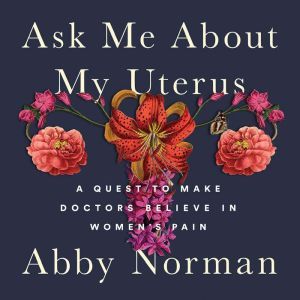Quotes
Selected as one of the top ten titles in Lifestyle for Spring 2018.—Publishers Weekly
"Required reading for
anyone who is a woman, or has ever met a woman. This means you."—Jenny Lawson, authorof Let's Pretend This Never Happened and FuriouslyHappy
"This book deals with
such an important subject. Abby Norman's odyssey with her own health is sadly
an all too common story to those of us who suffered in silence for so long. My
hope is that anyone involved in women's health will read her story and revisit
the way we treat women and their health concerns in our culture."—Padma Lakshmi, NewYork Times best-selling author and co-founder of the EndometriosisFoundation of America
"A fresh, honest, and startling look at what it means to exist in a woman's body, in all of its beauty and pain. Abby's voice is inviting, unifying, and remarkably brave."
—Gillian Anderson, Actress, activist and co-author of We: A Manifesto For Women Everywhere
"[Norman] builds a convincing case that women
describing discomfort are more likely than men to be dismissed by physicians,
but along the way tells a story that will resonate with anyone (man or woman)
who has ever experienced pain.... [She] is a terrific
storyteller with a gift for weaving memorable anecdotes, some drawn from
medical history, others from recent scientific debates and most plucked from
her own travails... Norman's life is much more than a disease.... [An]
important addition to a long tradition of pain memoirs. Norman shares a
particular tale of suffering but expresses a common frustration about the
dearth of words to convey pain. Any schoolgirl can talk about love, Virginia
Woolf famously said, but 'let a sufferer try to describe a pain in his head to
a doctor and language at once runs dry.'"—New York Times Book Review
"Compelling and
impressively, Norman's narrative not only offers an unsparing look at the
historically and culturally fraught relationship between women and their
doctors, it also reveals how, in the quest for answers and good health, women
must still fight a patriarchal medical establishment to be heard. Disturbing
but important reading."—Kirkus Reviews
"From wandering wombs
to ovary compressors, Abby Norman's book is packed with fascinating historical
detail about how women's bodies have been misunderstood and mistreated by male
doctors for centuries. It is also an important reminder that there is still a
culture of silence surrounding women's gynecological health in the
twenty-first century, and that there is work yet to be done when it comes
to advocating for women's healthcare."—LindseyFitzharris, author of The Butchering Art
"With searing prose,
science writer and editor Norman pens a heartfelt medical history and memoir of
coming to terms with the limitations of one's physical body....A thoughtful read."—Library Journal
"Abby
Norman writes powerfully about her experience living with endometriosis and
presents research
on the disease and the history of women who were brushed off by medical professionals. You know, like how hysteria is anything that ails a woman, but the same
symptoms do not equate hysteria in a man. It's hitting all my feminist and
history and medicine buttons."—Book Riot
"Author and activist Abby Norman, has put decades of labor-including careful, independent medical study-into studying this phenomenon, as she describes in her book Ask Me About My Uterus, both a memoir and a trenchant manifesto."—The New Republic


